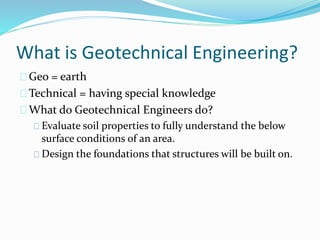The 10-Second Trick For Geotheta
The 10-Second Trick For Geotheta
Blog Article
The Ultimate Guide To Geotheta
Table of ContentsIndicators on Geotheta You Should KnowIndicators on Geotheta You Need To KnowAll about Geotheta7 Simple Techniques For Geotheta10 Easy Facts About Geotheta Explained

They perform website investigations, accumulate samples, execute research laboratory tests, and examine data to evaluate the suitability of the ground for building and construction jobs - Geotechnical Engineers. Based on their findings, geotechnical designers supply recommendations for structure layout, slope stability, keeping structures, and mitigation of geotechnical hazards. They team up with other experts, such as architects, architectural engineers, and building and construction groups, to make certain that geotechnical considerations are incorporated right into the overall task design and implementation
By analyzing the behavior and residential properties of dirt and rock, they can determine possible geotechnical threats such as landslides, soil negotiation, or slope instability. Their know-how aids protect against failings or accidents that can jeopardize lives and building. Here are some comprehensive responsibilities and obligations of a geotechnical engineer: Site Investigation: Geotechnical engineers conduct site examinations to collect data on subsurface conditions.
They interpret the information to recognize the residential properties and actions of the soil and rock, including their stamina, permeability, compaction features, and groundwater problems. Geotechnical Evaluation and Design: Geotechnical designers assess the data accumulated throughout website examinations to examine the security and suitability of the site for building projects. They carry out geotechnical estimations and modeling to assess elements such as bearing capacity, settlement, incline stability, lateral earth stress, and groundwater circulation.
The Definitive Guide for Geotheta
Foundation Layout: Geotechnical designers play a critical function in developing structures that can safely support the designated structure. They analyze the dirt conditions and lots demands to figure out the appropriate structure type, such as shallow structures (e.g., footings), deep structures (e.g (https://hub.docker.com/u/geotheta)., heaps), or specialized strategies like soil renovation. They think about elements such as negotiation limits, bearing ability, and soil-structure communication to establish optimum structure layouts
They review construction plans, monitor website tasks, and perform field assessments to confirm that the layout referrals are adhered to. If unforeseen geotechnical concerns develop, they evaluate the scenario and give referrals for removal or adjustments to the style. Risk Assessment and Mitigation: Geotechnical designers evaluate geotechnical hazards and threats connected with the project website, such as landslides, liquefaction, or soil erosion.

Partnership and Communication: Geotechnical engineers work carefully with other professionals associated with a job, such as designers, architectural designers, and building and construction groups. Efficient interaction and like this collaboration are important to incorporate geotechnical considerations right into the general project style and construction procedure. Geotechnical engineers give technical competence, solution inquiries, and guarantee that geotechnical needs are satisfied.
Unknown Facts About Geotheta
Below are some kinds of geotechnical designers: Structure Designer: Foundation designers specialize in making and analyzing foundations for frameworks. They analyze the soil problems, tons needs, and site characteristics to identify one of the most proper structure kind and design, such as superficial structures, deep foundations, or specialized methods like heap foundations.
They examine the aspects influencing incline stability, such as soil residential properties, groundwater conditions, and incline geometry, and create techniques to avoid incline failures and reduce risks. Quake Engineer: Earthquake engineers focus on analyzing and developing frameworks to endure seismic forces. They evaluate the seismic hazard of a website, assess dirt liquefaction potential, and create seismic design criteria to guarantee the safety and durability of structures throughout quakes.
They execute field screening, accumulate samples, and assess the gathered data to define the soil homes, geologic developments, and groundwater conditions at a site. Geotechnical Instrumentation Designer: Geotechnical instrumentation engineers concentrate on tracking and measuring the actions of dirt, rock, and frameworks. They mount and keep instrumentation systems that keep track of aspects such as soil negotiation, groundwater levels, incline activities, and structural displacements to examine performance and supply very early warnings of possible problems.
About Geotheta
They perform examinations such as triaxial examinations, consolidation examinations, direct shear tests, and leaks in the structure tests to collect information for geotechnical analysis and layout. Geosynthetics Engineer: Geosynthetics engineers concentrate on the design and application of geosynthetic products, such as geotextiles, geogrids, and geomembranes. They make use of these products to boost soil security, reinforce inclines, offer water drainage options, and control disintegration.
They tend to be investigatory individuals, which indicates they're intellectual, introspective, and curious. They are curious, methodical, rational, logical, and sensible. Some of them are also social, suggesting they're kind, charitable, cooperative, person, caring, helpful, understanding, sensible, and pleasant - Geo Tech Engineer.
In the office atmosphere, geotechnical engineers make use of specialized software program tools to do calculations, develop styles, and evaluate data. They prepare records, review job specifications, interact with customers and employee, and coordinate task tasks. The workplace setup supplies a conducive setting for study, evaluation, and partnership with various other experts involved in the task.
What Does Geotheta Mean?
They regularly visit task sites to conduct website examinations, evaluate geotechnical conditions, and collect information for evaluation. These brows through involve traveling to different locations, often in remote or tough terrains. Geotechnical designers may do dirt tasting, conduct examinations, and display building and construction activities to make certain that the geotechnical facets of the project are being implemented properly.
Geotechnical engineers likewise function in specialized geotechnical labs. In these centers, they perform experiments, carry out examinations on soil and rock examples, and analyze the engineering buildings of the products. Geotechnical laboratory designers work extensively in these settings, managing testing devices, running instruments, and recording data. They work together with other lab personnel to ensure precise and reputable testing results.
Report this page